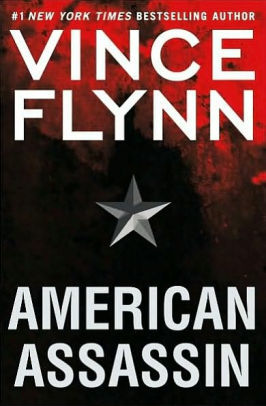
American Assassin
Chapter 7
by Flynn, VinceThe provided excerpt from *Chapter 7* of *American Assassin* by Vince Flynn primarily serves as promotional material, highlighting the book’s acclaim and the author’s reputation in the thriller genre. It emphasizes the popularity of the Mitch Rapp series, with quotes from critics and media personalities praising Flynn’s gripping storytelling and Rapp’s character as a formidable CIA operative. The chapter also includes a call to action for readers to explore other titles by Flynn and engage with the publisher’s offerings.
The excerpt underscores the novel’s relevance to contemporary geopolitical themes, particularly the war on terror, and positions Rapp as a modern-day action hero akin to Jason Bourne. Critics laud the book’s fast-paced narrative, political intrigue, and timely exploration of national security issues. The promotional text aims to entice readers by framing the story as both entertaining and thought-provoking, with endorsements from figures like Bill O’Reilly and Larry King adding credibility.
Additional details include copyright information, acknowledgments, and a dedication to the victims of the Pan Am Lockerbie terrorist attack, which hints at the novel’s emotional and historical depth. Flynn expresses gratitude to his family, colleagues, and sources who contributed to the book’s creation, revealing the collaborative effort behind his work. The prelude teases the protagonist’s internal conflict, setting the stage for a high-stakes narrative.
Overall, the chapter excerpt functions as a bridge between marketing and storytelling, blending praise for the author with a glimpse into the novel’s themes and characters. It reinforces Flynn’s status as a master of the political thriller genre while inviting readers to delve into Rapp’s origins and the adrenaline-fueled world of espionage.
FAQs
1. What is the significance of the title “American Assassin” in relation to Mitch Rapp’s character?
Answer:
The title “American Assassin” reflects Mitch Rapp’s role as a CIA-trained operative who becomes a lethal weapon in America’s war on terror. The chapter’s promotional text describes Rapp as “the nation’s ultimate hero” and compares him to Jason Bourne, emphasizing his exceptional skills in covert operations. The term “assassin” highlights his willingness to use extreme measures to protect national security, while “American” underscores his patriotic motivations. This duality captures Rapp’s complex identity as both a protector and a ruthless operative in postmodern thrillers.2. How does Vince Flynn establish Mitch Rapp’s credibility as a thriller protagonist in this chapter?
Answer:
Flynn establishes Rapp’s credibility through multiple layers of praise from critics and comparisons to iconic characters like Jason Bourne. The chapter includes endorsements from major publications (e.g., The Providence Journal, The Washington Times) that laud Rapp as “the best CIA-trained human weapon” and “a Rambo for the war on terror.” These accolades position Rapp as a formidable and relatable hero. Additionally, Flynn’s emphasis on Rapp’s “steely gaze” and “young man primed” for action suggests a backstory of rigorous training and psychological depth, further solidifying his appeal.3. Analyze how the chapter’s promotional content reflects the post-9⁄11 cultural context.
Answer:
The chapter’s text explicitly ties Rapp’s story to post-9⁄11 anxieties, calling it “the best thriller to come out of [that era].” Phrases like “war on terror,” “political correctness impeding effort,” and “homeland security” mirror real-world debates about counterterrorism tactics. Flynn’s focus on a protagonist who bypasses bureaucracy to combat threats resonates with contemporary frustrations about governmental inefficiency. The Free Republic.com quote—criticizing political correctness for “invit[ing] carnage to our shores”—further aligns the novel with conservative critiques of U.S. security policies post-9⁄11.4. What thematic contrasts are suggested by the dedication to Pan Am Lockerbie victims?
Answer:
The dedication to Pan Am Flight 103 victims introduces themes of justice, vengeance, and the human cost of terrorism—central motifs in Rapp’s story. By linking Rapp’s fictional exploits to real-world tragedies, Flynn blurs the line between fiction and reality, reinforcing the novel’s exploration of moral ambiguity. Rapp’s role as an assassin may symbolize retribution for such attacks, while the dedication reminds readers of the innocent lives lost, creating tension between empathy for victims and endorsement of extrajudicial violence.5. How does the chapter’s structure (e.g., critical praise, dedication) prepare readers for the novel’s tone?
Answer:
The chapter’s front matter—bombastic endorsements, a somber dedication, and a rapid-fire list of Rapp’s attributes—sets a tone of urgency and gravitas. The critical praise primes readers for high-stakes action (“pure high-powered exhilaration”), while the Lockerbie dedication adds emotional weight. The juxtaposition of these elements signals a narrative that balances adrenaline with moral complexity. Additionally, the brevity of the Prelude’s opening lines (“Mitch Rapp stared at his reflection…”) hints at introspection amid chaos, suggesting a protagonist who is both ruthless and self-aware.
Quotes
1. “Behind the steely gaze of the nation’s ultimate hero is a young man primed to become an AMERICAN ASSASSIN”
This quote encapsulates the core premise of the chapter - introducing Mitch Rapp as a formidable yet developing protagonist being molded into America’s deadliest weapon against terrorism. It sets the tone for his origin story.
2. “Rapp is still the best CIA-trained human weapon this side of Jason Bourne”
A significant comparison highlighting Rapp’s elite skillset and establishing him as a peerless operative in the thriller genre. This quote reinforces his status as a uniquely capable protagonist.
3. “Simply stated, there’s nothing better than watching Mitch Rapp in fiction knock off the bad guys nobody seems able to get in fact”
This quote speaks to the wish-fulfillment aspect of the story, explaining Rapp’s appeal as a character who can accomplish what real-world counterterrorism efforts often cannot. It captures the series’ core fantasy.
4. “A Rambo perfectly suited for the war on terror”
A concise yet powerful description positioning Rapp as the ideal fictional response to post-9⁄11 security concerns. This quote contextualizes the character within modern geopolitical anxieties.
5. “Every American should read this book.”
Bill O’Reilly’s endorsement (though not from the narrative itself) is included as it represents the novel’s perceived cultural significance and its appeal to a particular political perspective on counterterrorism.
